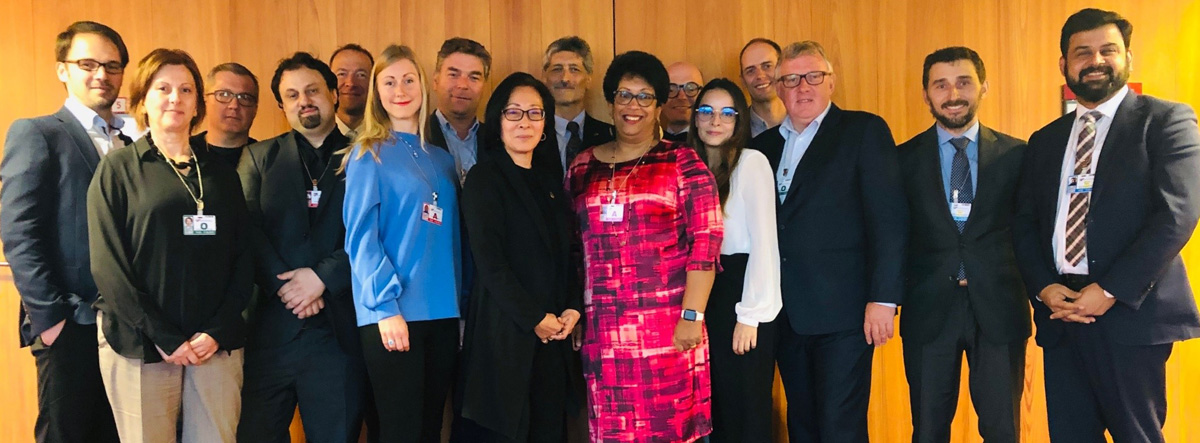Professors Richard Haigh and Dilanthi Amaratunga, of the University’s Global Disaster Resilience Centre, spoke at the sixth session of the Global Platform for Disaster Risk Reduction (GP2019)
TWO Huddersfield professors played a key role at a major global conference alongside some of the world’s top disaster risk reduction policy-makers and government officials to discuss ways of reducing the impact of natural disasters.
Professors Richard Haigh and Dilanthi Amaratunga, attended the sixth session of the Global Platform for Disaster Risk Reduction (GP2019) in Geneva. Both professors are leading experts in disaster resilience and co-direct the Global Disaster Resilience Centre at the University of Huddersfield’s School of Art, Design and Architecture.
The Global Platform is recognised by the UN General Assembly as being the main global forum for policymakers and officials to share strategic advice and review the current implementation of international policies on disaster risk reduction.
Disaster Risk Reduction (DRR) aims to reduce the damage caused by natural hazards, like earthquakes, floods, droughts and cyclones, through an ethic of prevention. The severity of a disaster depends on how much impact it had on communities and the destruction caused to the local area.
This year’s theme, Resilience Dividend: Towards Sustainable and Inclusive Societies focused on managing disaster risk and risk-informed development investments and how the benefits of doing so, far outweigh economic profit.
The two professors were invited to contribute to the debates on the growing importance of disaster risk reduction to achieve the 2030 Agenda for Sustainable Development, the contribution of the Sendai Framework towards the Paris Agreement for Climate Change, the Agenda for Humanity and the New Urban Agenda.
Professors Haigh and Amaratunga also devised and led a workshop entitled National and Local Disaster Risk Reduction Strategies – Bringing Together Action at All Levels co-organised with government agencies and state officials from Niger, India, Japan, Italy and Germany.
Two of the topics under discussion were how local policies and plans must be locally-led and guided by community knowledge and how local disaster risk reduction strategies are imperative if national ones are to be implemented.
A plenary session to the main event officially launched a flagship publication from the UN European Science and Technology Advisory Group (ETAG). It was entitled Socioeconomic and data challenges: Disaster risk reduction in Europe.
Professor Amaratunga, a member of ETAG, co-authored and contributed to the report which focuses on the issues affecting disaster risk reduction throughout the European continent.
The continued need to invest in, strengthen and improve end-to-end early warning systems was brought to the fore during the Second Multi-Hazard Early Warning Conference (MHEWC-II). This pre-event to the Global Platform took place at the head office of the World Meteorological Organisation in Geneva earlier in the week.
Professor Amaratunga delivered a keynote speech where she said there’s an increasing need to strengthen local level warning systems to build resilience to climate extremes and disasters.
This was the last global gathering before the deadline to achieve Target (e) of the Sendai Framework. The aim of the Framework is to substantially increase the number of countries using national and local disaster risk reduction strategies by 2020. The delegates said accelerated action was needed if the seven targets of the Sendai Framework for Disaster Risk Reduction 2015-2030 were to be successfully met.
The following month the two Professors attended the 10th Global Forum on Urban Resilience and Adaptation, in the City of Bonn in Germany. They consulted with local authorities, partners and stakeholders involved in urban, climate and disaster resilience.
More news
Disaster Risk experts improve Ciliwung River Basin
The disaster risk research team has been granted £541,655 to improve the lives of the 3.5 million people living along the river
Tsunami warning exercise by Uni disaster experts
Training for Sri Lanka and Indian Ocean-wide Tsunami Warning and Communications Exercise
€390k project on rebuilding after displacement
The Centre will play a key role in the policies for built environment restoration following natural disasters and conflict-induced displacement

